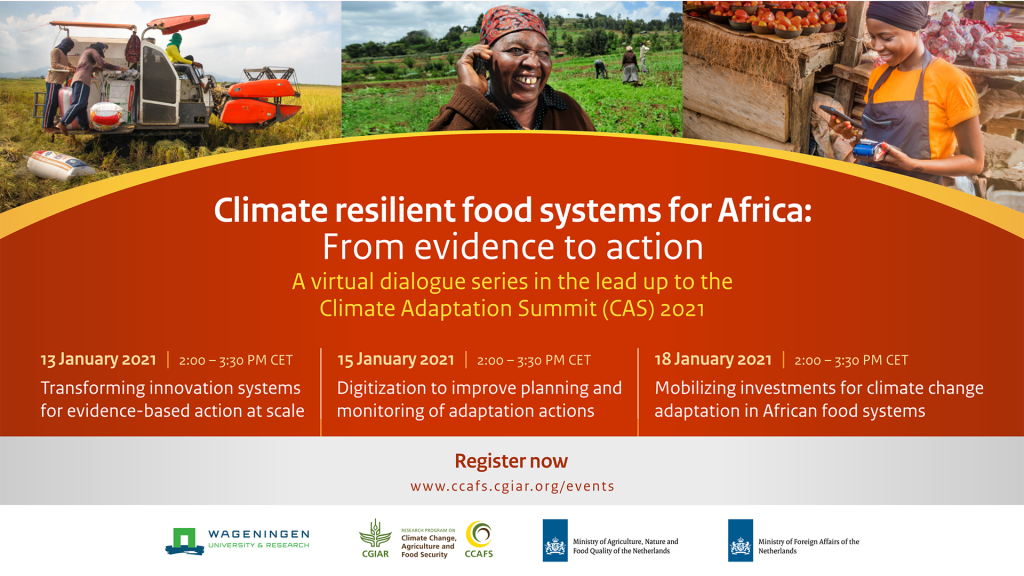
Climate resilient food systems for Africa: From evidence to action
-
Date
13.01.21 > 18.12.20
-
Location
Online
Together with Wageningen University & Research, the Dutch Ministry of Foreign Affairs and the Dutch Ministry of Agriculture, Nature and Food Quality, CCAFS is organizing a virtual dialogue series on African climate resilient food systems.

Registrations for the virtual dialogue event series is required, please register using the form below:
Background
The challenges facing the food system, particularly in Africa are immense and the global community is not on track to meet SDG targets or the Paris Agreement.
The Global Commission on Adaptation in its flagship report Adapt Now calls for a Revolution in Understanding, a Revolution in Planning, and a Revolution in Finance.
Meanwhile, the Actions to Transform Food Systems Under Climate Change report focuses on 11 actions needed, including the transformation of innovation systems (i.e. how ‘understanding’ interacts with planning, finance and action). It also puts emphasis on finance, and the role of the private sector in driving transformational change.
The CGIAR Research Program on Climate Change, Agriculture and Food Security (CCAFS) and Wageningen University & Research (WUR) are committed to developing scientific insights for food systems and putting these insights into practice to shape sustainable food systems transformations—together with farmers, cooperatives, businesses, financial institutions, NGOs and governments.
This virtual dialogues series taps into the competitive advantages of the host institutions to convene key stakeholders to catalyze evidence-based action, which builds on earlier efforts outlined.
The three virtual dialogues will cover a range of themes:
- Evidence-based approaches to address food and climate crises. This will include the role of digitization, diversification, changing diets, and implications for urbanization.
- Supporting action through guidance on ‘how to’ integrate climate change adaptation actions with the (demand-driven) developments sparked by COVID-19 response and recovery. This will include an emphasis on monitoring of results.
- Promoting market development by sharing insights from investing in and supporting scale-up of climate resilient business models (including digital, data tech, impact investing, sectoral development efforts).
- Identify opportunities to align efforts to transform food and agriculture in the lead up to the Climate Adaptation Summit, UN Food Systems Summit, and COP26.
- Transforming innovation systems, to develop seamless innovation systems for the continent, characterized by end to end solutions from the research community supporting food systems transformations (including the role of the IPAF).
- Offering user perspectives on lessons drawn from action research and projects for climate resilience.
The three virtual dialogues
Click on the below tabs to find out more about the dialogue sessions:
Objectives
With the overarching aim of catalyzing evidence-based action to enhance climate resilience of African food systems in the lead up to the Climate Adaptation Summit, the dialogues have the following specific objectives:
- Understanding: Promote evidence-based action while also catalyzing efforts to address knowledge gaps. (What do we know? What do we need to know? Where is our innovation system failing?)
- Planning: Improve the efficacy of policy development planning processes (of different stakeholders in specific regional contexts within Africa) through digitization, also enabling the achievement of other food systems outcomes.
- Financing: Address the finance gap (private and public investments for adaptation in African food systems.) Based on efforts to achieve these objectives, the dialogues will develop a narrative on climate-resilient food systems for Africa to be presented during the technical session of the Africa anchoring event.
Based on further inputs during the session, the key messages will be refined and also articulated at relevant forums of the UN Food Systems Summit and COP26 in 2021.
Hosts




.png)




